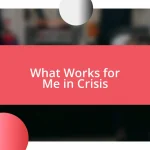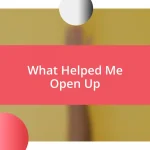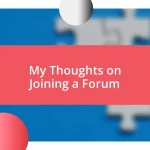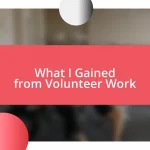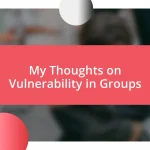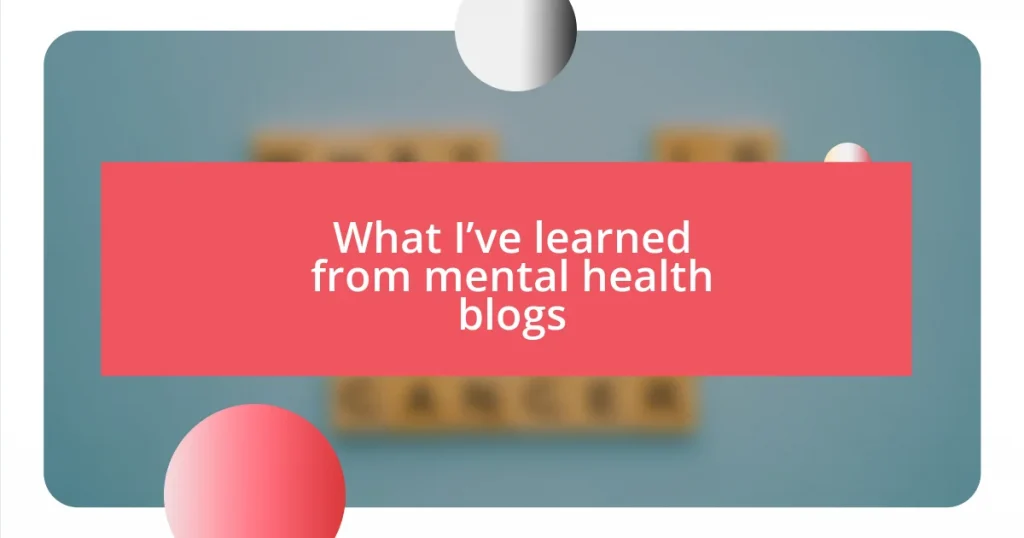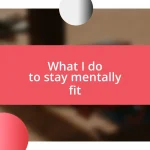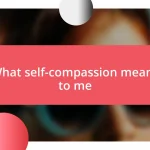Key takeaways:
- Mental health blogs bridge clinical insights and personal stories, fostering connection and providing validation for shared struggles.
- Raising mental health awareness cultivates empathy, encourages support, and helps individuals seek help without fear of judgment.
- Building supportive communities through shared experiences and conversations significantly enhances mental well-being and reduces feelings of isolation.
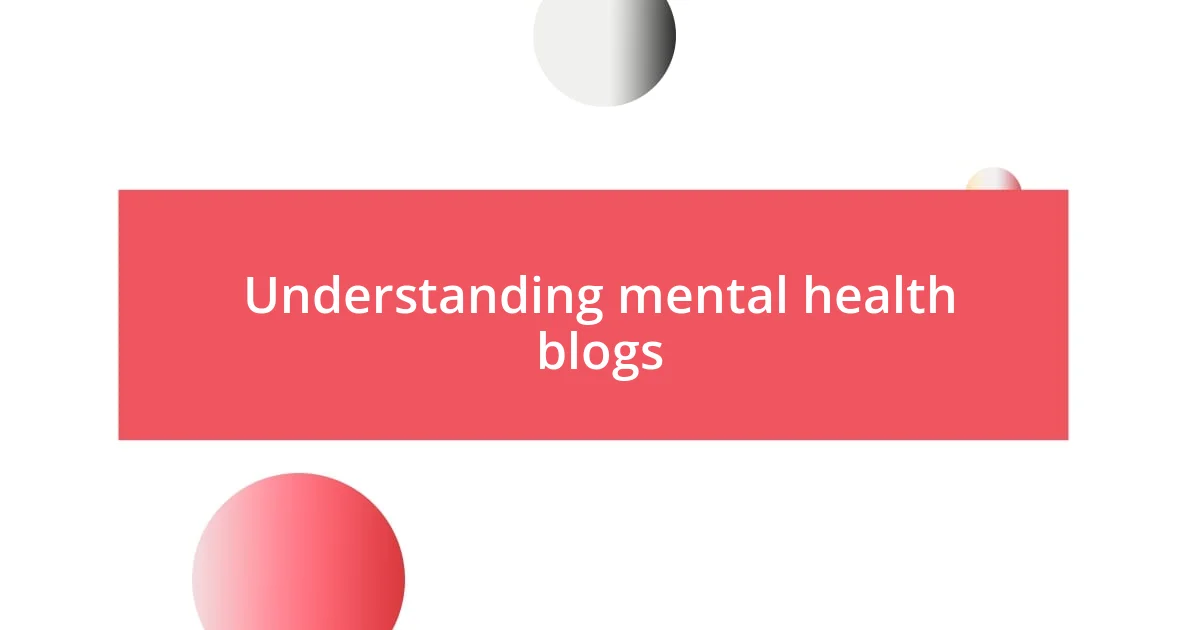
Understanding mental health blogs
Mental health blogs are a unique space where individuals can share their experiences and insights on various mental health issues. I remember stumbling upon a blog after a particularly tough week; the writer’s authenticity struck a chord with me. It made me wonder—how many others find solace in the words of someone who truly understands what they’re going through?
These blogs often serve as a bridge between the clinical aspects of mental health and personal narratives. As I read through stories of resilience, I felt a deep sense of connection. It raised a question for me: why do we resonate so much with others’ struggles? I realized it’s because, at our core, we all seek validation and understanding in our battles, and these stories provide just that.
Additionally, mental health blogs are a treasure trove of resources and coping strategies. I once found a post detailing mindfulness techniques that helped the author manage anxiety. After trying those methods myself, I felt both empowered and grateful. It’s fascinating to see how a simple blog post can inspire practical changes in our lives; it makes me think—what if everyone shared their tools and tips? The potential for growth and healing is immense.
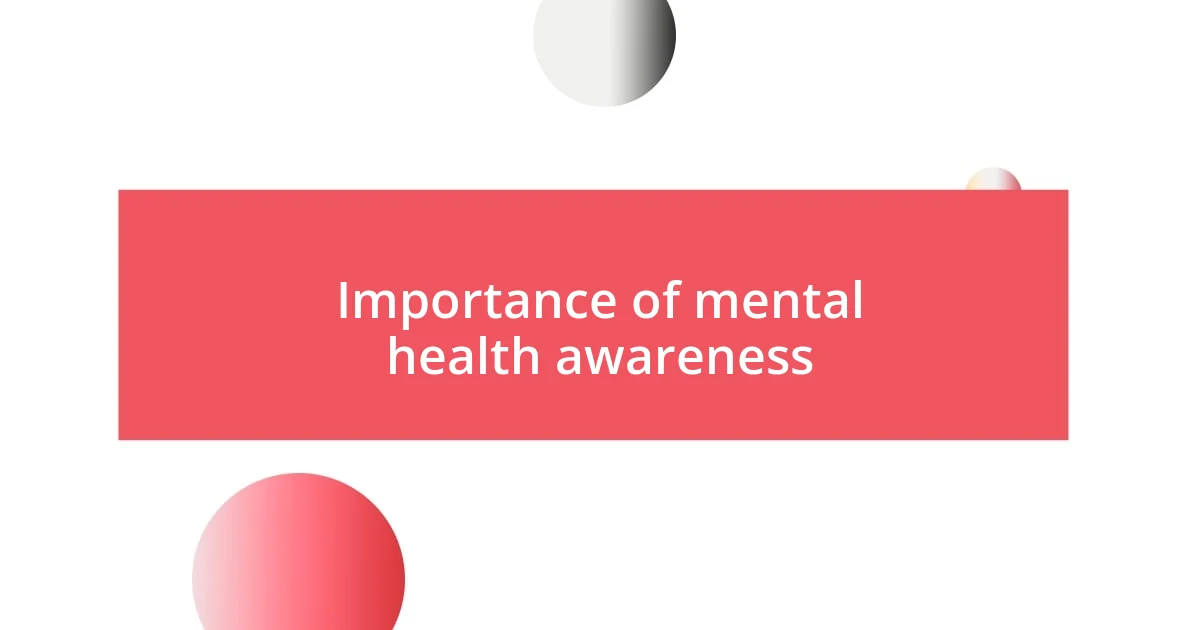
Importance of mental health awareness
Mental health awareness is crucial in shaping our understanding and approach to mental well-being. I often reflect on how stigma still clouds discussions around mental health. The more we talk openly, the more we can fight misconceptions and create a safe space for those struggling. It’s a wake-up call, really. Every time I see someone share their story, it reminds me that we’re all in this together, breaking down barriers one conversation at a time.
- Raising awareness helps people recognize signs of mental health issues early on.
- It cultivates empathy and compassion among individuals and communities.
- Promoting mental health awareness encourages support systems for those in need.
- It empowers individuals to seek help without fear of judgment.
- Awareness campaigns can lead to policy changes that enhance mental health services.
Seeing firsthand how a friend’s openness about their anxiety prompted others to share their experiences has been incredibly powerful for me. It illustrates that when we prioritize mental health, we create a ripple effect. This ripple effect fosters understanding and connection, transforming how we view and support one another in our mental health journeys.
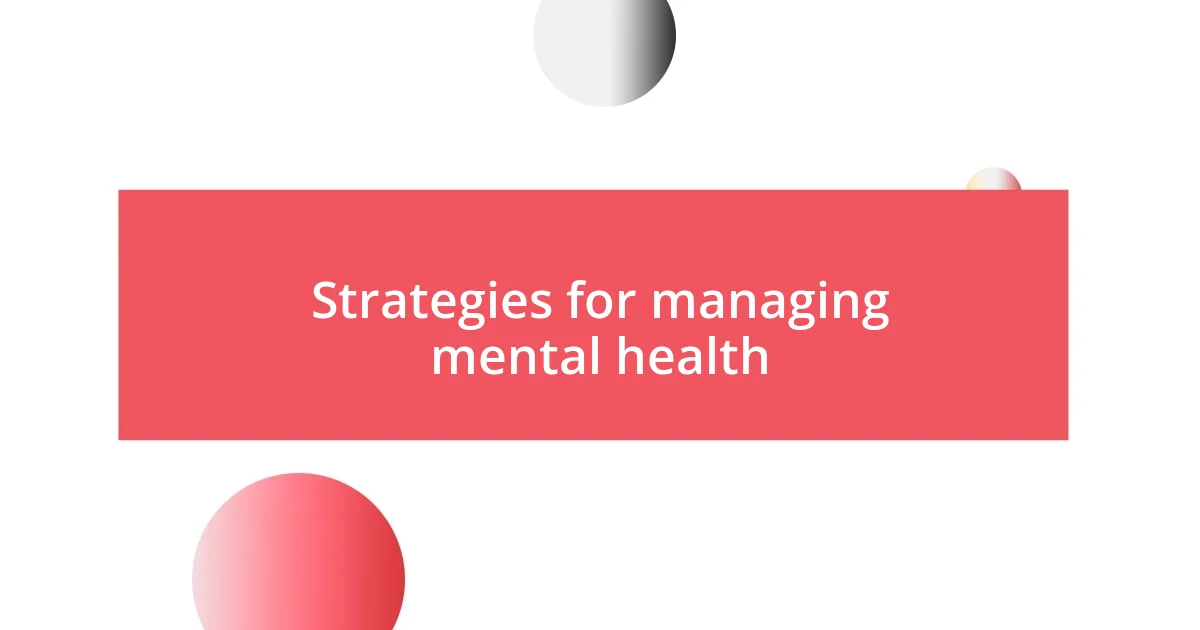
Strategies for managing mental health
When it comes to managing mental health, I’ve learned that developing a routine can significantly impact our overall well-being. For a while, I struggled with consistency in my self-care practices, but when I began setting aside specific time slots for activities like meditation or journaling, I noticed a change. Suddenly, my days felt more anchored, and I was better equipped to tackle stressors as they arose.
Another effective strategy I’ve encountered is the practice of gratitude. I remember an evening when I sat down to jot down three things I was thankful for, and it shifted my entire mindset. Reflecting on the positive aspects of my life—no matter how small—has become a comforting ritual that brings me peace even on tough days. It’s incredible how focusing on positivity can help shift our cognitive patterns.
Lastly, connecting with others is crucial. I often felt isolated in my struggles, but joining online communities transformed this experience for me. Sharing thoughts and listening to others created a sense of belonging, reminding me that I’m not alone. Through these shared experiences, we foster a space of understanding and support that can be a lifeline.
| Strategy | Benefits |
|---|---|
| Establishing a routine | Increases consistency in self-care practices, providing structure and stability. |
| Practicing gratitude | Shifts focus to the positive, enhancing emotional resilience and overall outlook. |
| Connecting with others | Fosters a sense of community and shared understanding, reducing feelings of isolation. |
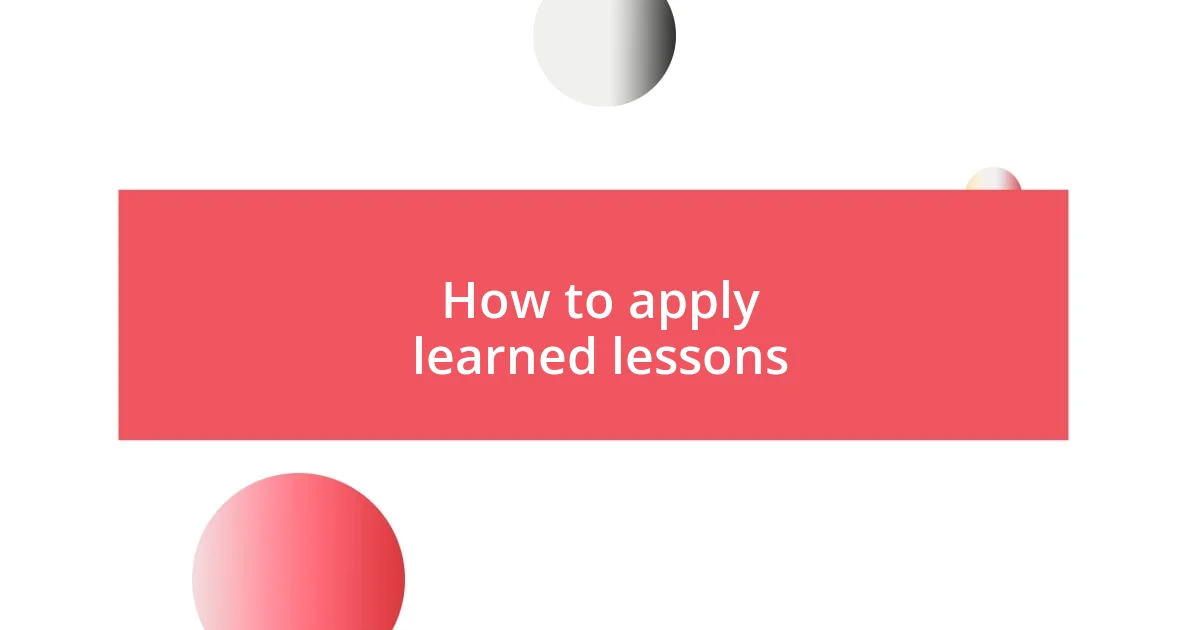
How to apply learned lessons
Applying the lessons learned from mental health blogs can be both enlightening and transformative. One approach that has worked wonders for me is integrating small, actionable steps into my daily life. For instance, after reading about the power of mindfulness, I started pausing for just two minutes each day to focus on my breath. This simple practice has helped me ground myself, especially during chaotic moments. Have you ever tried just being present for a brief moment? It can be incredibly refreshing.
I’ve also found it helpful to create a personal “mental health toolkit,” where I compile the techniques and insights I’ve discovered through blogs. For me, this included a list of affirmations, calming music playlists, and even my favorite quotes. Sometimes, I find myself revisiting this toolkit when I’m feeling overwhelmed. It’s like having a friend who offers support right when you need it. What do you think you’d include in your own toolkit?
Lastly, actively sharing what I’ve learned with others has provided a surprising sense of fulfillment. Whether it’s starting a conversation with friends or posting a reflection on social media, teaching others not only reinforces my understanding but also helps break the stigma around mental health. I remember sharing a gratitude practice I picked up, and hearing how it resonated with someone else felt incredibly rewarding. Isn’t it amazing how sharing can open up new dialogues and strengthen connections?
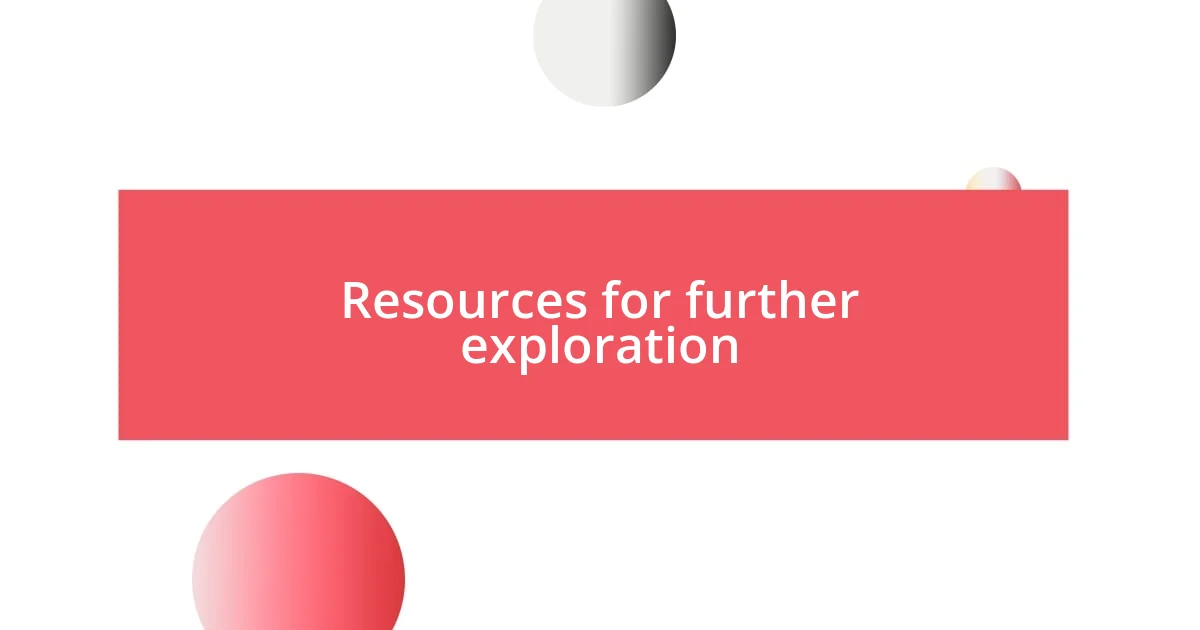
Resources for further exploration
Finding valuable resources can deepen your understanding of mental health. One of my go-to platforms is Psychology Today, where I’ve discovered numerous articles written by professionals. These pieces often break down complex topics into digestible insights, making it easier for readers like us to grasp essential concepts. Have you ever come across a piece that resonated so deeply it changed your perspective? I certainly have.
Another fantastic resource is mental health podcasts. I remember when I stumbled upon a series focused on anxiety management. Listening to the intimate stories shared by guests added a personal touch that written articles sometimes lack. The narratives often felt like sitting down for a heart-to-heart with a friend, fostering a connection that could be quite motivating. Have you tried listening to any podcasts? You might find one that speaks directly to your experiences.
For hands-on tools, websites like MindTools offer practical exercises that can be integrated into daily life. I recall trying one of their stress management techniques, which involved assessing my current stress levels and pinpointing sources. This simple activity helped me feel more in control and was surprisingly eye-opening. Exploring these resources can lead to significant self-discovery—what tools do you think could be beneficial for your own journey?
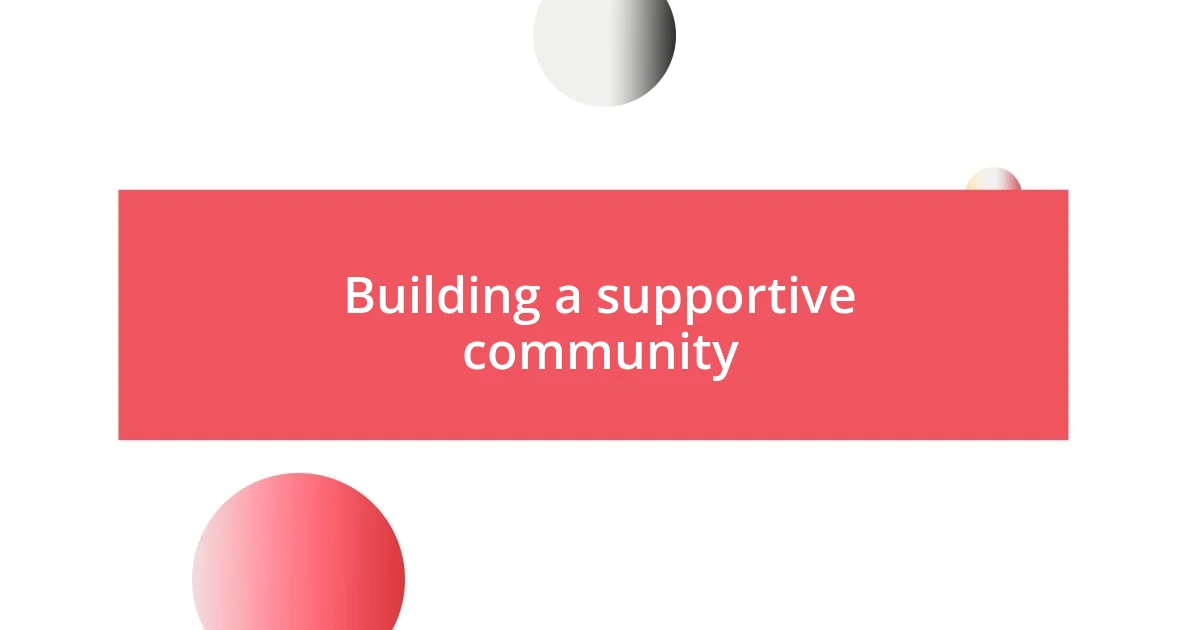
Building a supportive community
Building a supportive community around mental health has been a game changer for me. I vividly remember joining a local online support group after feeling isolated during a tough time. The collective understanding and shared experiences transformed my struggles into something manageable. It made me realize, have you ever felt the weight of loneliness lifted just by being among those who get it?
In my journey, I also discovered the power of peer support. Organizing small meet-ups with friends to discuss mental health not only strengthened our bonds but also created a safe space for vulnerability. I recall a night when we opened up about our challenges over tea, and it felt as though the room was filled with acceptance and warmth. Isn’t it incredible how a simple conversation can lead to profound healing?
Moreover, participating in mental health awareness events has shown me how communities can unite for a greater cause. I once volunteered at a community fair where we shared stories and resources. Seeing the connections formed that day reinforced my belief that together, we can break down barriers and stigma. How empowering is it to know that by coming together, we can support one another in our mental health journeys?
